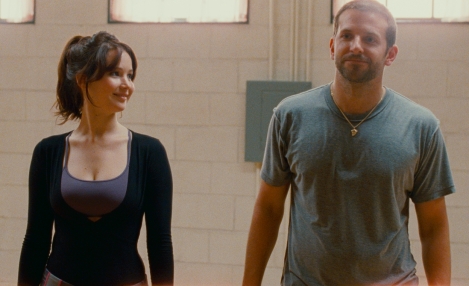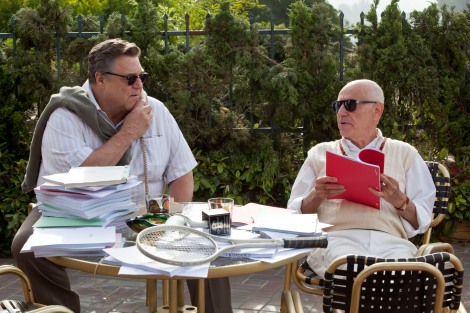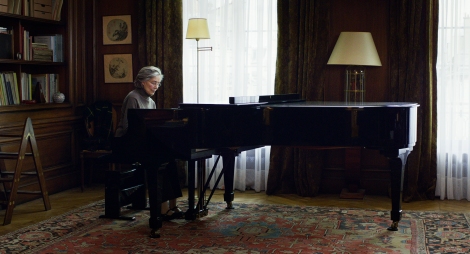The second in a three-part series in which AwardsLine breaks down all nine of the best picture contenders. This article appeared in the Jan. 30 issue of AwardsLine.

Silver Linings Playbook
What the Academy says: 8 nominations (Picture: Donna Gigliotti, Bruce Cohen, Jonathan Gordon; Directing: David O. Russell; Lead Actor: Bradley Cooper; Lead Actress: Jennifer Lawrence; Supporting Actor: Robert De Niro; Supporting Actress: Jacki Weaver; Film Editing: Jay Cassidy, Crispin Struthers; Adapted Screenplay: David O. Russell)
What the public says: $71.4M domestic boxoffice; $19.8M international (as of Feb. 1)
What Pete Hammond says: Because it is a comedy, albeit one laced with drama, Silver Linings Playbook is at a disadvantage right out of the starting gate because comedies don’t traditionally win best picture Oscars. But this critically acclaimed story about two broken people who are trying to get their lives back together benefits from a passionate base of admirers, and that’s key in building a best picture campaign. Plus, it has the Oscar campaign know-how of the Weinstein Co., which has won the best picture Academy Award for two years running. And now it has achieved a landmark in Oscar nominations, becoming the first film since Warren Beatty’s 1981 film Reds to win nods for picture, screenplay, director (for David O. Russell who was overlooked by the DGA), and all four acting categories. Additionally, it even got an editing nomination, which every best picture winner has had since 1980. The pundits say it is an underdog, but the tea leaves are starting to say it could really happen.
What other awards say: 3 BAFTA noms, 4 CCMA wins for acting ensemble, best comedy, best actor in a comedy for Bradley Cooper, and best actress in a comedy for Jennifer Lawrence; 1 best actress in a musical/comedy Golden Globe for Lawrence; 5 Spirit Award noms; 1 SAG Award for lead actress Lawrence; plus a WGA nom for Russell.
What the critics say: “Lawrence and Cooper face off in the most convincing way, matching each other stride for crazed stride. It would spoil the fun to even hint at all what goes down between two people equally possessed by partners who are not coming back, but you can be sure it won’t be dull. That’s also true for Silver Linings Playbook as a whole. Russell’s gift for smart, honest, and unexpected dialogue and situations keeps you off-balance in an almost addictive way. He’s brought a reality to the world’s damaged, uncertain strivers that makes them next door to irresistible, and that can’t have been an easy thing to do.”—Kenneth Turan, Los Angeles Times
What the producer says: “I don’t want to speak for (Russell), but he does say this all the time, that having had the experience on The Fighter in dealing with the creative core of that movie, he felt as though he could extend what he was exploring in that film,” Donna Gigliotti explains. “He really does think about these two films as companion pieces. And you can see why he thinks that. They’re dealing with similar themes. So while it wasn’t easy—I don’t want to undersell this idea that it was like, ‘Oh, great, he made The Fighter. Fine, let him make Silver Linings’—there were a lot of issues going on in terms of how I got him the budget that he needed, putting together textiles in Philadelphia, shooting it on a schedule that made sense for the budget. After The Fighter, he wanted to go back to work; there were other projects out there. But I never doubted that this was the one that he was most attached to emotionally.”
What the filmmaker says: “I needed to work, I needed to write something and I needed to make a living,” Russell says. “And I also really, really responded to the material. So it was a matter of having the tone right. You had to not stop working on the tone all the way through the editing process. The key to the whole thing is to keep it real, is to keep the people’s emotions committed and real.”

Argo
What the Academy says: 7 nominations (Picture: Grant Heslov, Ben Affleck, George Clooney; Supporting Actor: Alan Arkin; Film Editing: William Goldenberg; Original Score: Alexandre Desplat; Sound Editing: Erik Aadahl, Ethan Van der Ryn; Sound Mixing: John T. Reitz, Gregg Rudloff, José Antonio García; Adapted Screenplay: Chris Terrio)
What the public says: $118.2M domestic boxoffice; $71.5M international (as of Feb. 1)
What Pete Hammond says: With its director Ben Affleck famously dissed by the directors branch, this extremely well-liked (if not loved) movie managed to land seven nominations overall, a good showing that keeps it in the race—and remember Affleck still got one of those noms as a producer of the film with Oscar veteran George Clooney and Grant Heslov. But can it become the first film since 1989’s Driving Miss Daisy to win best picture without a director nomination? Time will tell if it can and also if, oddly, it only wins best picture, considering the film is not really thought of as a frontrunner in any of the other six categories in which it is nominated. Now wouldn’t that be an Oscar twist for the ages?
What other awards say: 7 BAFTA noms, 2 Golden Globe Awards for best director and best drama, 2 CCMA wins for best picture and director, 1 SAG Award win for ensemble, PGA Zanuck Award, plus DGA and WGA noms.
What the critics say: “Mr. Affleck handles his own roles, on camera and behind it, with a noticeable lack of self-aggrandizement. He doesn’t show off with his direction or the performances, going for detail instead of bombast with eerie silences, traded glances, trembling gestures, and beaded sweat. (It’s a good guess that he’s committed the unnerving opening of Three Days of the Condor to memory.)”—Manohla Dargis, The New York Times
What the producer says: “We thought it would be a tricky film to market because it’s got an odd title, and it’s a very hard film to sell,” says Heslov. “On one hand, it’s a real nail-biter thriller, and on the other hand, there’s a lot of comedic moments. But it’s not a comedy. If you sell it as a comedy, people are going to be disappointed. So it was tricky, but I think the studio did a great job. We’re really happy with what they did with it.”
What the filmmaker says: “L.A. turned out to be our saving grace. Had we just stayed in Turkey, we would have been completely screwed because we couldn’t get any Farsi speakers,” Affleck says. “Then I was told there’s a huge population of Iranians here—they call it ‘Tehrangeles,’ and there are half a million Persians here. It was like realizing that you’re sitting on a gold mine. Not only that, but there’s this very robust theater tradition and acting history, and all these bilingual people. They really understood what you wanted in English, and they could do it well in Farsi. So we switched the airport scene (to L.A.), and we had 500 Persians in Ontario, CA, pretending to be stopping our houseguests from leaving Tehran. We had so much enthusiasm. For them it was like someone was telling their story. They knew the airport. They knew that the tile in the bathrooms was teal, to the point where I would go, ‘That’s good. We don’t need all that, we don’t have any scenes in the bathroom.’”

Amour
What the Academy says: 5 nominations (Picture: Margaret Ménégoz, Stefan Arndt, Veit Heiduschka, Michael Katz; Directing: Michael Haneke; Actress: Emmanuelle Riva ; Original Screenplay: Michael Haneke; Foreign Language Film: Michael Haneke [Austria])
What the public says: $1.8M domestic boxoffice; $13.1M international (as of Feb. 1)
What Pete Hammond says: One of the rare films to win both best picture and best foreign language film nominations (Z, The Emigrants, Life Is Beautiful, Crouching Tiger, Hidden Dragon were the others), Amour looks very strong with directing, writing, and lead actress bids as well. However, no foreign language movie has ever won best picture, and it is a long shot to think the Academy will award it both picture prizes since it is a foregone conclusion it wins in the foreign film category. An original screenplay win for writer-director Michael Haneke is probably most likely to be the only other Oscar category it could take, matching the feat of another film that starred Amour’s leading man, Jean-Louis Trintignant, when A Man and a Woman won both in 1966. But in a year with so many genuine contenders and the possibility of a widely split vote among as many as six films, could this one sneak in? It has a passionate fan base in the Academy, and anything is possible in this topsy-turvy year.
What other awards say: Cannes Film Festival Palme d’Or winner, 4 European Film Awards (best actor, actress, director, film), 1 Golden Globe win for foreign language film, 4 BAFTA noms, 1 CCMA win for best foreign language film, and an Indie Spirit nom for best international film.
What the critics say: “Considering Haneke’s confrontational past, this poignantly acted, uncommonly tender two-hander makes a doubly powerful statement about man’s capacity for dignity and sensitivity when confronted with the inevitable cruelty of nature. Acquired by Sony Pictures Classics before Cannes, this autumnal heartbreaker should serve arthouse-goers well—not for first dates, but for those who’ve long since lost count.”—Peter Debruge, Variety
What the producer says: “When I first met Michael Haneke, it was during the sound mixing of The Piano Teacher, and he said to me, ‘Perhaps we can do something together?’ I said, ‘I’m not sure I can spend two years of my life with cruelty and blood!’ And he let out this big Austrian laugh,” exclaims Margaret Ménégoz who has worked with him since 2003’s Time of the Wolf. But did she have any sway in terms of convincing Haneke to take on more humane films like Amour? “I don’t think so,” says Ménégoz. “He decided that.”
What the filmmaker says: “I don’t think I made a film about aging or dying, but rather in my personal life, I was confronted with the case of someone who I loved very deeply, someone in my family who was suffering very deeply, and I had to look on helplessly at the suffering. That led me to think about making the film. I could just as easily have made a film about a 40-year-old couple who is coping with a child dying of cancer, but however tragic that story would have been, it would have remained an individual case, whereas old age is something all of us are going to have to cope with at some point,” Haneke explains.

